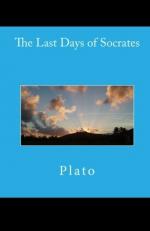
|
| Name: _________________________ | Period: ___________________ |
This test consists of 5 multiple choice questions, 5 short answer questions, and 10 short essay questions.
Multiple Choice Questions
1. According to the introduction to the Phaedo, what are the most likely causes of suicide?
(a) Release from pain, or consequences.
(b) A desire for a measure of control over one's death.
(c) Guilt and low self-worth.
(d) A desire for attention, or to be remembered.
2. According to Crito and Socrates, is it just to harm another person if it is purely in retaliation?
(a) It depends on the circumstances.
(b) No.
(c) The two can't agree.
(d) Yes.
3. What is the reason, according to Socrates, for "mislogic"?
(a) People are more interested in "winning" an argument than in knowing the truth.
(b) People don't know how to use logic correctly.
(c) People are defeated in logical arguments.
(d) People don't understand the limitations of logic.
4. What term did the Greeks use to refer to the souls of the departed?
(a) Ghosts.
(b) Spirits.
(c) Shades.
(d) Daemons.
5. What new activity did Socrates try while in prison?
(a) Writing down some of his dialogues.
(b) Writing poetry.
(c) Singing.
(d) Meditating.
Short Answer Questions
1. On what day does the "Phaedo" take place?
2. What concept does Tarrant label as "Christian," which he says the Greeks did not possess?
3. According to Crito's dialogue with Socrates, who had the right to control a given set of circumstances, or a relationship?
4. What metaphor does Tarrant use to describe the different mentalities in the Phaedo?
5. What were Socrates and his partner debating about at the end of Book 5, Chapter 2?
Short Essay Questions
1. What do Socrates' friends say about suicide, and the preservation of life, in the "Phaedo"?
2. How does Crito attempt to persuade Socrates?
3. What is the "transmigration of souls"?
4. What were the ancient Greeks' beliefs regarding the afterlife?
5. What realization does Socrates have as a result of his and Phaedo's debate with Simmias and Cebes?
6. What is "Idealism" in philosophy?
7. What evidence led Plato and the Pythagoreans to the theory of an eternal soul?
8. What is said, in Book 4, about Socrates' dream?
9. What is the setting of Book 4?
10. What do Socrates and Crito say about experts?
|
This section contains 789 words (approx. 3 pages at 300 words per page) |

|




